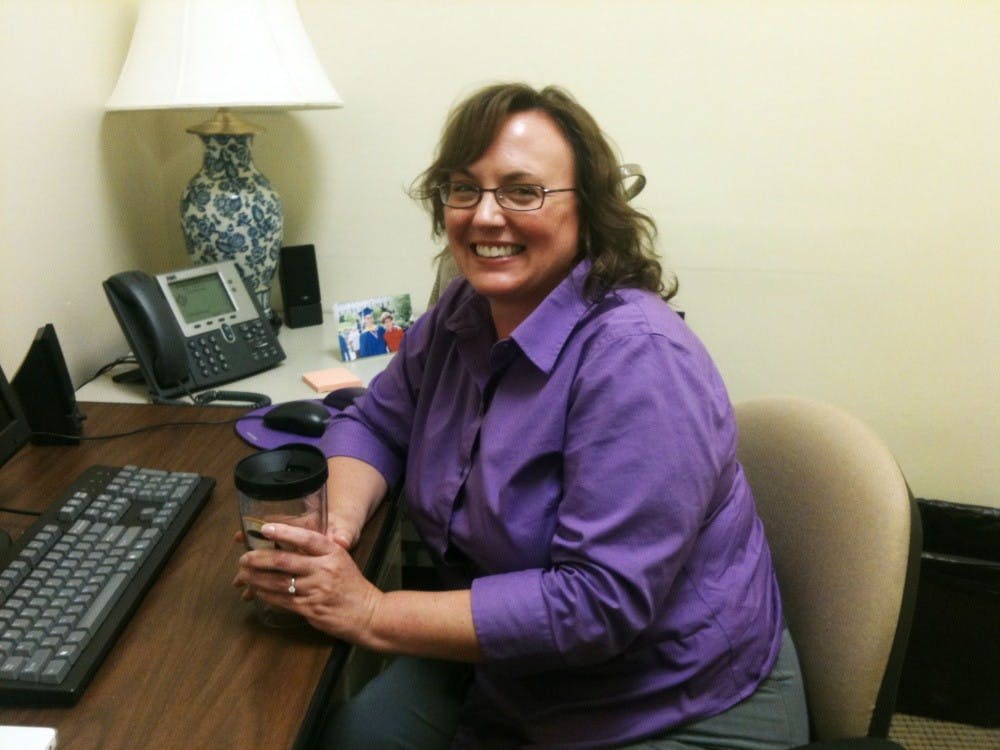Sitting in her office, gun holstered and badge in full visibility, Crystal Sharpe, adjunct professor of human service studies, reminisces on the 6-foot wall she put up in her backyard to practice scaling for the physical test at the police academy.
"Thank God they took that out of the test," she said.
Now a sergeant at the Graham Police Department, Sharpe said she found her true passion in law enforcement.
But having such a prestigious title as a woman working in law enforcement is no small feat.
"Even as a very small child, she had a very unique personality," said Libby Sharpe, Crystal Sharpe's mother. "She was a very happy baby and loved people and being in the middle of everything. She was always very inquisitive. She loved books from an early age. She wanted to know how everything worked and why."
After high school, Sharpe attended UNC Chapel Hill and went on to receive her graduate degree at the State University of New York at Albany. She knew she was headed for a career in law enforcement when she was in high school and the convicted serial killer Ted Bundy murder trial dominated the news.
"Ted Bundy was about to be executed," Sharpe said. "It was in the news and it made me interested in the whole justice system in general and it challenged me to think about the death penalty and things like that, and somehow I thought about being a police officer. And that's how it ended up, I guess."
Sharpe's dreams of a career in law enforcement were only furthered through her experience working for Family Abuse Services.
"I started in October of 1996," she said. "I was a paid employee at first, and I guess I never stopped. I only stopped being paid."
She developed close relationships and a new perspective on working with people to help realize their potential.
"The biggest deal for me is that at least two of the victims that I helped went on to work in the field," she said. "It's pretty amazing, and we'll always have that connection that's different from anybody else, really."
Angela Jones, associate dean of Elon College, College of Arts and Sciences, works with Sharpe on the board of Family Abuse Services.
"We have served on the board together for several years now," Jones said. "She's a dedicated member of the board, makes every effort to attend our meetings and actively participates in supporting the organization any way that she can. She led the group through some difficult decisions and did so with patience and kindness."
It was after spending time at Family Abuse Services that Sharpe realized joining the police force would be her next step.
Sharpe acknowledges that many people who have negative attitudes toward the police are teenagers or college students.
"Young people rely on media, word of mouth and maybe a traffic stop," she said. "Most of those kids don't have good images of the police."
This is why Sharpe said she loves teaching criminal justice.
"You get to meet so many different people," she said. "People don't really understand the difference between the images they see in the media and what the real justice system is like. Being able to bridge that gap and show people where it's similar, and for the most part where it's not, is what I really like to do."
Sharpe makes a profound impact through her dynamic methods of teaching, according to students.
"I thought all cops were mean," said Kate Gorman, a former student. "I learned through Crystal and other officers that she brought in to speak to us that they're people first, and police officers second."
With more than a decade of experience as a female officer, Sharpe is not one to put up with discrimination based on her gender or rank.
"There's discriminating against female officers, and then there's messing with me," she said. "I've been a female supervisor and it's not well-received. Will I call you out on it if you're talking about somebody else? Most likely, yes. You do what you can to keep your job and keep your sanity, and sometimes those things compete with one another."
A challenge of working in the police force, according to Sharpe, is separating her life at work from her life at home.
"I'm pretty good at it," she said. "I was 30 when I started rookie school. I already had a life. But when you become a cop, you hang out with cops and they become your social network. I'm in a women's club, and that's a good escape for me because I can do volunteer work and hang out with my girlfriends and it's nothing about police work. That helped me be a separate person."
When it comes to significant others, sometimes a higher degree of discretion is necessary.
"There's some stuff they don't need to know and they don't want to know," Sharpe said. "You don't want them to be afraid for you. I try not to focus on the bad stuff. I don't subject my fiance to those people."
When asked what she would like to be doing 10 years down the road, she has several ideas, ranging from catering to counseling.
"I'd like to be doing something else," she said. "I'm not a one trick-pony. I don't see myself in law enforcement in 10 years. I'd like to get married. I haven't figured out exactly what I'm going to do next."
Even though she aspires to try new things in the future, Sharpe said she enjoys what she is doing now.
"She loves people and loves helping people," Libby said. "She also loves teaching. Seeing her students do well really makes her happy. On a personal level, she is very loving, devoted and protective of her family and very loyal to her friends. Needless to say, I am very proud of her both as my daughter and as a professional."


